Story and photos by Joe Longobardi
Asheville, NC.
A brief timeline:
September 11, 2001. The United States of America is under a terrorist attack. It is concluded that the master mind behind the attack is Osama bin Laden who is headquartered somewhere in Afghanistan.
October 7, 2001, The United States of America, aided by Great Britain, declares war on Afghanistan.
In 2002, a Congressional hearing concludes that then Iraqi President Saddam Hussein was partly instrumental in the attacks on September 11, 2001, and that Iraq, through the use of weapons of “mass destruction,” is capable of attacking the United States resulting in an aftermath in the form of a “mushroom cloud.”
March 19, 2003, the United States of America declares war on Iraq.
And so it’s come to pass—October 7, 2011 officially marks the war in Afghanistan as the longest running ongoing combat mission in U.S. History. What started out as a photojournalism project for a photography class became a concerted effort to impart the soul of the protest movement in the United States. In February 2008, I embarked on a personal journey to inquire as to what was in the minds and hearts of these people I only passed by as I drove through downtown Asheville, NC.
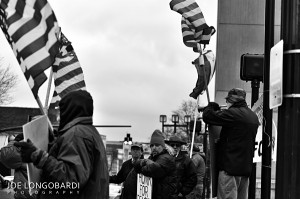
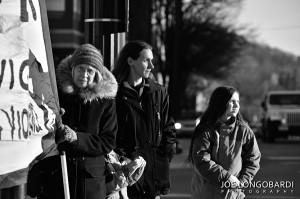
But I found it necessary to put this story aside for a period of time. My decision to hold off on presenting this piece to anyone was twofold. First, it weighed heavily on me attend memorials for the dead U.S. soldiers and rerun peoples’ personal stories in my head. I found it necessarily to allow the piece to incubate so that I can concentrate on it more objectively. Second, it actually made more sense to release it near the ten year anniversary of the war on Afghanistan. This decision was based mainly by the fact that over time, the wars have slowly receded from our collective memory. Even though we continue to engage in combat, only by sharing this on a milestone like a decade of war could I even fathom anyone really expressing interest in this story.
What has transpired in the United States since my initial interviews is, to say the least ,eerily prophetic. Many of the concerns expressed by the people I interviewed at the time where generally entertained by those who were actively involved in understanding the role of the United States as the unofficial police of the world. From economics to trade to politics, save for those who were curious to dig deep into how much of our lives are compromised by bloated bureaucracy and mismanaged finances, few people seemed all that concerned. That changed after the financial meltdown that occurred in this country during the Fall of 2008. And sadly it took such dire circumstances that are only now are just revealing the ugly underbelly of that mess to get peoples’ attention. Case in point, the current wave of Occupy Together demonstrations held not only in solidarity with the Occupy Wallstreet movement in New York, but as a grassroots movement that has evolved as a backlash to the greed and corruption on the our financial institutions.
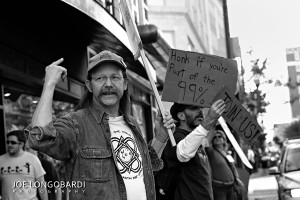
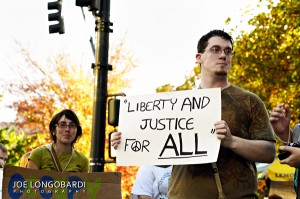
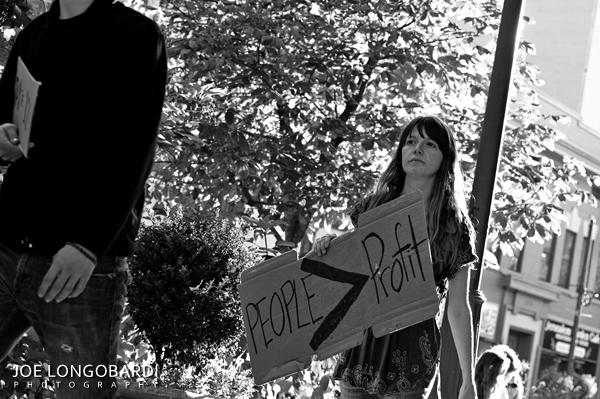
But I don’t want to get ahead of myself. The series of interviews I conducted and present here were not intended to be merely stark fact. In fact, they exceeded my goal of addressing the human factor and the effect that the sterility of modern warfare can have on those who refuse to blindly accept pat answers that at best declare that there are “known unknowns.”
Much of the opinions and seasoned living that was imparted to me from those I spoke with continues to echo in mind; every so often reaching a crescendo of synchronicity as I continue to witness many of the warnings come to pass. The following interviews were conducted over a period of several years. Though the original intent of the work was to be in the tradition of photojournalism, much of what I gathered from my interactions with the individuals I photographed seemed too important to play a secondary role in their documentation. Hence, I felt it appropriate to follow up much of what I had gathered in the original interviews. Because of the nature that I approached the interviews, the responses were the result of my deferring to internal frustrations allowing for spontaneous candor rather than a traditional interaction of questions and answers.
WIB
The Women In Black (WIB) are a loosely organized group of peaceful demonstrators that have chapters in various cities across the United States. The organization can trace their origins as far back as 1988 in the State of Israel when Israeli and Palestinian women stood in in silent vigil for peaceful coexistence. Some 150 cities hold silent vigil groups worldwide. Nearly every Friday, since 2002, they would take to Pack Square in front of the Vance Monument to stand in silence between 5 and 6 p.m. as a means of expressing a profound sadness for societal and cultural atrocities. At times, I’ve seen families sitting and eating while maintaining their presence for this cause. Sometimes they stand 20 or more strong; other times, only one or two are there to hold up their tattered banner.
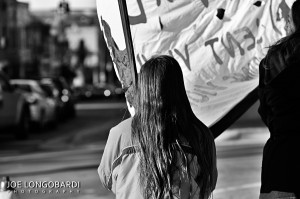
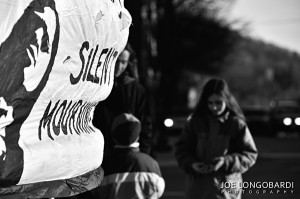
On my first outing, I began by taking photos of the group commencing to set up their banner, a woman who I later came to know as Michelle turned to me and said, “I don’t know who you are, but peace to you.” It was from that statement that I understood what they must have had to tolerate from those who felt threatened or suspicious of their activities. While there, I briefly mentioned what I was doing. Michelle confided that the police would come out to take photos of them, so they were rightly suspicious of my activities.
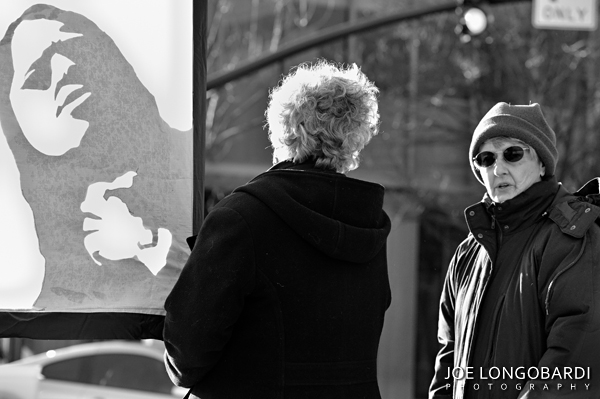
One woman dressed in more regal black attire caught my attention as she handed out fliers to passersby. As I approached her to inquire more about the group and who she was, she said her name was Red Moon Song.
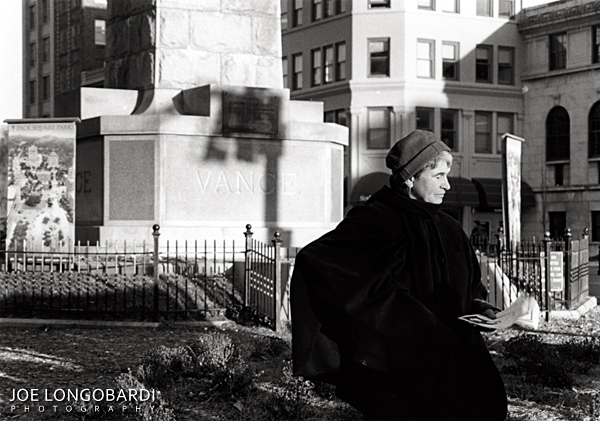
Red Moon Song claimed to have been involved in these types of movements since the 1970’s. I learned form her that this particular vigil had no real organizational structure—no team leader so to speak, but instead a loosely organized attendance based on who can actually make it to the vigil. “The vigil is open to all”, she explained. Her task at hand that day was handing our simple black an white two-sided fliers that explained who they are and what the organization is about. The fliers state simply, Women in Black. A public expression of grief. “A simple flier is more effective”, explained Red Moon Song. “The essence of the message is the key to reaching people. If it’s not there, a more elaborate design will not necessarily convey your message effectively. [And] you’re not aggressive about it. You do not force a flier on a person.”
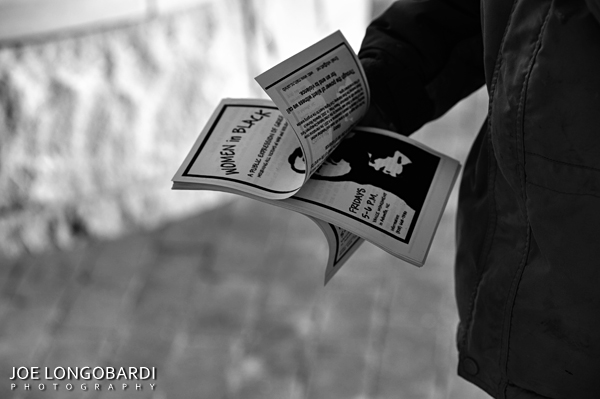
After some light conversation, Red Moon Song offered me the name of one of the organizers by the name of Denise McClellan who would be more than happy to grant me an interview.
Denise McClellan
I contacted Denise the next day. Starting with the question as to the purpose of the Women In Black and why they chose the Vance Monument to stand, she said that ”The vigil is a way to let people know how they feel. Protest groups [like WIB] stand at Pack Square because everyone will see them.” Inquiring about the history of their vigil in Asheville, she replied,”After the war broke out in Iraq, there was a strong sense of patriotism. Many people mocked, screamed or cussed at us.” Someone even yelled out ‘Get back into the kitchen!’”
“Over time [as the war dragged on] people acknowledged us more favorably—even thanking us for doing this. People would drive by with thumbs up or honking their car horns.” “Sometimes I feel like a tourist attraction”, laughed McClellan.
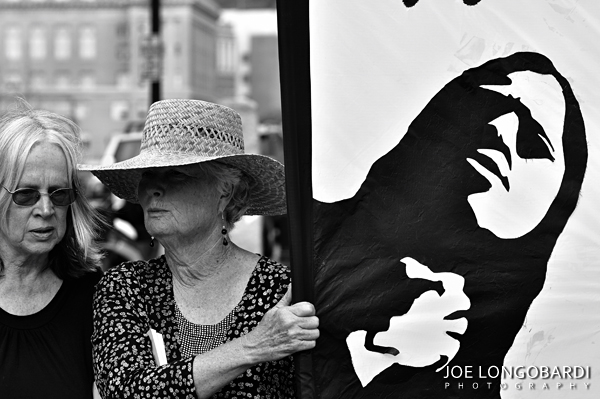
I asked her about the arrest of some members back in 2003. Pack Square had been closed to the public by order of the Asheville police just after the U.S. war was declared on Iraq. “It was done in hopes of ending protests”, explained McClellan. In the spirit of Thoreau’s proclamation for ‘civil disobedience’, “We decided to protest even after the Vance Monument was barricaded. People [including the police] knew we were intent on this and we did anticipate arrest.” “I was one of ten people arrested that day”, she continued. Forty people in total showed up in defiance of the blockade—even some drummers showed up. We were arrested by the police basically so they could save face. Even after the arrest, more people began to show up.”
The group eventually went to court in the city of Asheville. They enlisted the aid of the American Civil Liberties Union to argue in their defense that they were exercising their right to free speech. “The court case just dragged on”, said McClellan. “We had to continue to come back.” “The police testified that they didn’t want to show favoritism, and that they really wanted to stop young people from protesting”, McClellan continued. The age group was made up of those in their 40’s and 50’s. “Eventually we were declared guilty and we were fined one-hundred dollars a piece. We were charged with trespassing—for standing in a city park!”, laughed McClellan.
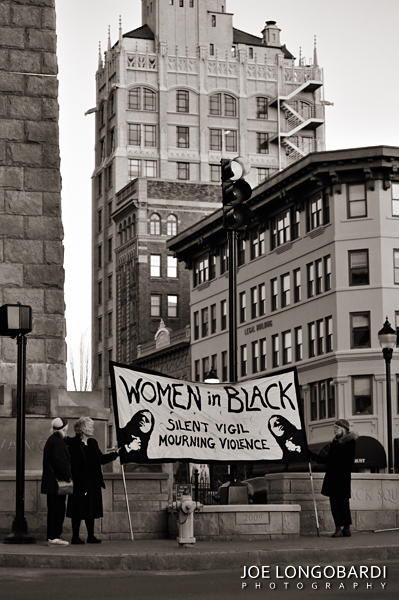
Inquiring about the inconsistent number of individuals that may show up at any one time at Pack Place, McClellan stated that people come and go over time. “Reasons in [the] heart can change with issues of the times”, added McClellan. In 2003, the Asheville chapter of Women In Black received the Evan Mahaney Civil Rights Award for exercise of their First Amendment rights.
VFP
Every Tuesday at approximately 4 p.m, Veterans of the Vietnam War assemble at the Vance Monument at Pack Square in downtown Asheville in a daring and demonstrative display of outrage towards atrocities committed in the name of U.S. Democracy. Called Veteran’s For Peace (VFP), the group in Asheville is one of several chapters across the United States. Not just a group of individuals that need to address war by taking their message to the streets, they raised over $20,000 in North Carolina alone for Afghan orphanages. Nationwide, local chapters raised another $17,000.
Veterans For Peace is a national organization founded in 1985. The organization includes men and women veterans of all eras and duty stations spanning the Spanish Civil War (1936-39), World War II, the Korean, Vietnam, Gulf and current Iraq wars as well as other conflicts.
The group is the antithesis of the WIB. Blaring trumpets and air horns; holding stark signs demanding the heads of Bush and Cheney without apology over their heads; and never backing off from a confrontation form those who may challenge their outrage, the group is a spectacle of those who fought for their country and demand that it does the right thing.
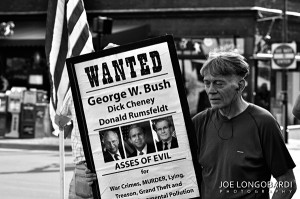
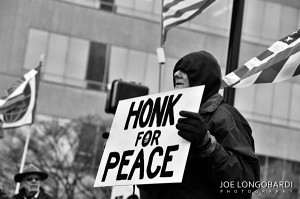
While taking photos of them in action (and it can be quite the dance in the street to capture that definitive moment while simultaneously dodging oncoming city buses), what was to become almost iconic in my mind was that of a bearded gentleman wearing a sign that featured the image of then President Bush with the word “LIAR” above his face. Blowing into a brass horn in response to every car horn that honked for peace as it passed the group, I came to learn that his name is Bob Feldman, a former Vietnam vet that served in the early 1970’s.
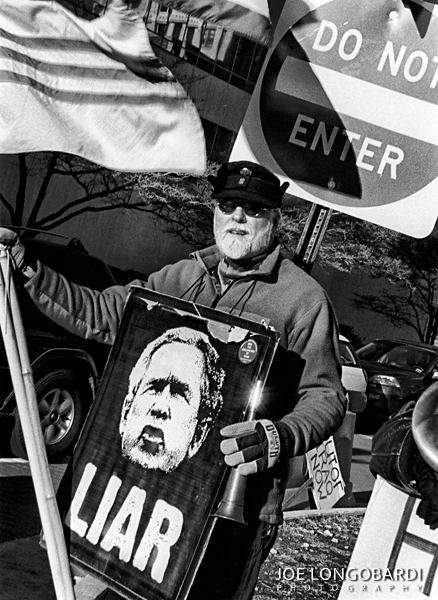
Loyd Peterson
I had the opportunity to speak with former VFP president Loyd Peterson. His name was given to me by Denise McClellan of the WIB during our conversation on the phone. The label of ‘president’ is a bit of a misnomer as Peterson explained that the group is not rigid in its organization—it’s more about passion for their beliefs, rather than the dogma of indoctrination—hence his title was more in name only.
I started by asking if he felt that the protest movement in the U.S. today is more of a grassroots movement that is unreported by the media. Peterson replied that he believed that to be the case. “American entertainment media is void of any in-depth reporting– it was swept out years ago save for small indie papers. People would rather be entertained by American Idol that concern themselves with hard reality—almost like Holocaust deniers.” Peterson continued that what passes for news these days is “horse shit!” [People would rather] concentrate on more light-hearted T.V. Fare. The entertainment media and news media has blurred into a single entity—one almost indistinguishable from the other. He added, “If you’re not outraged, you’re not paying attention.”
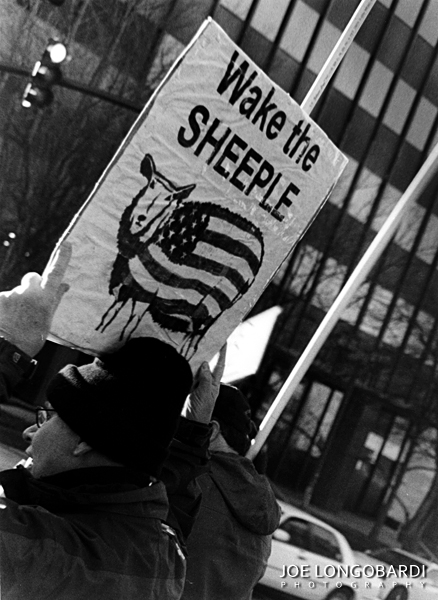
The conversation moved onto the topic of returning vets from the Middle East. Peterson said that “Many of us who served in Vietnam told these young people who were so gun-ho to serve that they really had no understanding of what they were getting into. Many have returned with severe mental and physical disabilities but refuse to reach out to us older vets because of the fear of hearing us say ‘we told you so’”.
Treading immediately onto the topic of the wars in the Middle East and the intention of the Veteran’s For Peace, Peterson started by mentioning that the “First two or three years we encountered higher incidences of hostility from people. 2006 saw a peak of hostility towards the protests as may people believed that there was a favorable turnaround just around the corner. And yet, many supporters of the war never stepped up to serve. Today we encounter few if any personal encounters [with those who disagree with the group’s message].” Personal confrontations to curtail their protests “occur during the Summer when there is greater foot traffic.”
The suppression of speech is not new, of course. Of particular note is one incident that occurred around that time. The VFP owned a piece of private land just on the outskirts of downtown Asheville that was home to a large custom billboard that featured updates on the number of U.S. soldiers wounded and killed in combat. One day, a member of the group encountered several individuals employed by the city in the process of placing a banner of the U.S. flag and the phrase “support the troops” just over the VFP’s billboard. When confronted, the city employees said that it’s pretty standard for the city to update boards. The city employees were then notified that this particular billboard and the land it was on is private property that belonged to the VFP. After several phone calls, the city employees apologized for the confusion stating it was some sort of bureaucratic mix-up. “The issue was that our billboard is a custom size, and not a standard size that is employed all over the city”, asserted Peterson. “Someone had to order that banner as a custom job particular to the dimensions of our billboard.”
The subject of dissent eventually brought up the name of the late Senator Paul Wellstone who perished in a plane crash on October 25, 2002 along with his wife and daughter. Wellstone was one of eleven Senators that voted against authorization of war on Iraq. Wellstone was a leading spokesman for the progressive wing of the national Democratic Party and harsh critic of then President Bush. On his death, Peterson remarked, “When Wellstone went down in that plane crash, don’t think the message was lost on the rest of Congress.”
When I asked him his opinion on the use of depleted uranium in bombs used to target enemy outposts in Iraq, his hear sank. “We won’t have to concern ourselves with fallout of depleted uranium for several years”, he explained. “After that, we have to pay the price. With a half life of some 4-5 million years we will have to contend with this for years to come.” I mentioned that Japan is still reeling from the effects of the 1945 bombings of Hiroshima and Nagasaki and new birth effects resulting from the radiation fallout. “And those were two little bombs”, responded Peterson.
I brought up the under reportage by the main media of depleted uranium with Peterson adding that the United States never owned up to using white phosphorus on their own troops during Vietnam. “Not us” Peterson said with facetious intent, “we’re the good guys!”
Turning to the economics of the war, Peterson said that “Oil is the white elephant in the room that no one what to talk about—it will not be there forever. [Oil companies] are stalling for time to make enough money. Cars are still getting the same mileage as twenty fuckin’ years ago! The People that believe oil just regenerates deep inside the Earth [are] the same people who do not believe in evolution.”
“We’ll have a military presence in the Middle-East for the next 30 to 40 years. We need to rearrange our lives. At this point it’s not sustainable”, Peterson added.
I eventually got around to inquiring about his fellow VFP member Bob Feldman. Loyd explained that “Bob feels more deeply wronged by the U.S. Government than most of us. He was an adviser in Vietnam during the 1970’s. He’s extremely knowledgeable about the history of Vietnam and the role we played as far back as the when the French were engaged in that country’s colonization in the 1940’s.”
Touching on the subject of a correlation between the Vietnam War and the wars in Iraq and Afghanistan, Peterson asserted that “Many vets never felt the was in Vietnam was about battling Communism.”
At the age of 50, Peterson burned his old draft card.
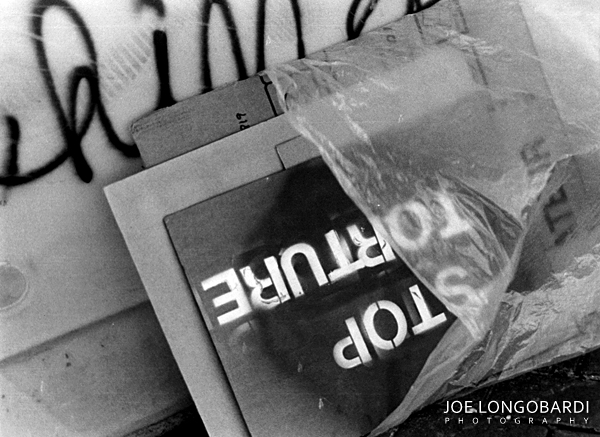
Bob Feldman
‘History’ being the dominant theme, and with a fair amount of preparation, I called Bob Feldman at his home. I explained that I was working on a report on war protestors. What transpired was not so much an interview as much as my eagerness to defer to his frank and passionate assessment of where we are today as a Nation; how we got here; and where we are heading. Regarding his presence at the Vance Monument every Tuesday, Mr. Feldman was very matter of fact. Many of the statements he made that day in February of 2008 continue to echo in my mind.
“First, I don’t believe I have any real affect by being there”, he replied. “But I sleep better at night.” He continued adding “I speak for the dead. I speak for those who can no longer speak for themselves and for those hat are too upset to be present in mind and body.”
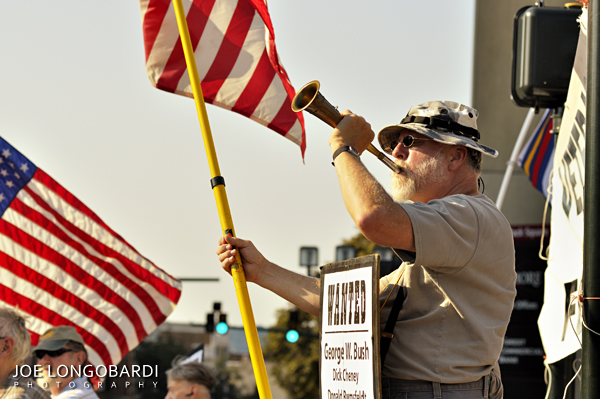
“History is written by the victors”, Feldman asserted , and that “we are never given the full story and that so much of what we hear is a recreation of past events. It fills me with rage what our government would import suffering on people to herald Democracy. I can’t believe that I a going this [protests] again after forty years—and that so many people my age who also protested and served their country as I did seem to have forgotten everything we went through. They don’t see the same patterns at work here again.” “I never thought that in my lifetime I would see our country in such a state without an armed revolution taken to the streets. We’ve become very complacent—blind–to this nightmare that is happening to this country. Feldman added, “My golden years have turned to brass!”
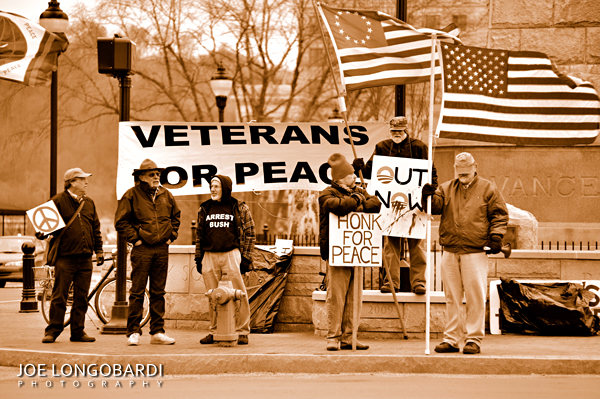
“Our government is bought and sold. It’s being broken and bankrupt to where we are at the mercy of Big Business—and we won’t have any recourse to impede its demands on working families. [We are in] servitude n the best tradition of serfs and sharecroppers”, Feldman exclaimed. “The best custom ordered chains ever made is called a mortgage…We’re in worse trouble than when the British were here.” Feldman remarked that the U.S. Military is slowly transforming into a “private mercenary army.” In an observation straight out of Machiavelli, he pointed out “Those [big businesses] who own a country are afraid of citizen soldiers—that’s’ why we don’t have a draft– we pay off mercenaries. The National Guard is a second line backup—not the main source of the U.S. Military. [The misuse] of the guard is destroying families and the United States Military.”
“People who live I fear look to Big Brother to help them. But people and an bankrupt government can’t control big Business”, added Feldman. “Ben Franklin wrote that it is our responsibility [as citizens] to question authority. In the movie Why We Fight (2005) is a clip of President Eisenhower’s farewell address to the United States in which he informed the Nation about the doings of the Military-Industrial Complex. When Eisenhower discovered that he was not in charge of the country, he was probably beside himself”, declared Feldman. “First hand history is very critical”, Feldman stated. “You want to know where you’re going. And it’s important to know where you’ve been and learn what ideas have worked.”
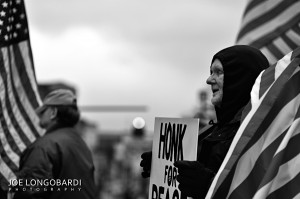
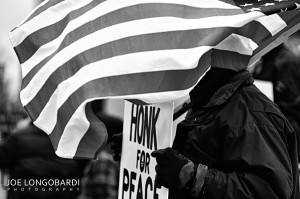
He continued, “My Uncle fought in WWI in France. He told me about his experience of being blinded by mustard gas in No Man’s Land and had to use a stick to find his way off the field to shelter. Firsthand accounts are very important in imparting history.” As may be expected, Feldman was less than enthusiastic regarding the track record of the then current Commander-In-Chief. “Bush calls himself a Born-Again Christian, scoffed Feldman. “The Iraq War is like a crusade—it has ulterior motives. The Muslim world is not jealous of our way of life. Killing children not born yet [or] letting them die of disease; and a U.S. occupancy of Saudi Arabia considered by the Muslim world as Holy Ground—that’s why planes hit buildings!”

Regarding Iraq’s political climate, he asked rhetorically “Are we going to teach them to love one another?” Implying Bush’s lack of first hand experience, Feldman added “Guys like Kennedy and Khrushchev were war vets—they knew the cost of war” to come full circle to drive his point home.
Bob suggested that I should speak with his daughter, Lena, who also participates in the demonstrations. I thanked him for his time.
It was a lot to digest.
***************************************************
I contacted Lena Feldman the next day. It was a short interview, but felt that it helped shed some light on the personal toll that the involvement of a cause can exact on anyone. Upon introducing myself and explaining the purpose of my article, she responded “You’re not working for Big Brother, are you?” I said no, but if I did they need to raise my pay.
That broke the ice.
Bringing up the topic of her father, Lena said, ”He’s my hero. The best insight he ever offered me is that the most subversive thing you ca do is exercise independent thought. He has a Good-Samaritan streak. He’s a kind person who always emphasizes following your conscious.”
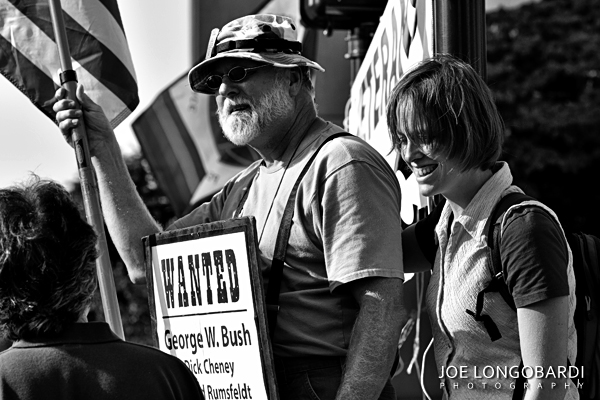
Lena came off as very compassionate expressing a profound empathy for the pain of others. “When I was about 8 years old” she explained, “I read a book on Hiroshima. After reading that book, I made some dots of people and scattered them around the floor.” I tend to get sucked into others’ realities”, she continued. After seeing the movie Kite Runner, I didn’t speak for two days.” I asked her about her participation with groups like VFP. For her personally, she said that it’s a “form of descent that can make you feel better.”
“I don’t want to work to pay taxes that go towards torturing and murdering people. I’m horrified [about] what’s being done in my name. I feel frustrated—like I wanted to dose myself with gas and light myself on fire”, alluding to a Buddhist monk’s self-immolation in 1963 in protest against Vietnam’s anti-Buddhist policies. “We Pisces are emotional creatures”, she added.
The interview was brief as Lena had to tend to some personal matters at home. She mentioned that there will be a vigil to mark the 5th anniversary of the invasion of Iraq and to honor the deaths of those who died in both wars. I thanked her for the invite and her time.
On the 17th of March, 2008, I attended the vigil held by the VFP where upon they read of the names of all U.S. service men and women who to date had died in both wars in the Middle-East. Each name read off was followed by the toll of a bell. After the ceremony, I approached Lena and her father with a packet that contained a photo of her father holding that sign of Bush declaring the 43rd President a “LIAR”.
I called her several days later asking about the photo. She explained that she was a little shocked at first due to its strong graphic nature. I apologized for upsetting her. Her response was that I “meant well. And I love any photo of my father, so I put it on the refrigerator and placed a large magnet on Bush’s face.”
Today, Lena is involved with the Asheville War Resisters League, is married and is the mother to three children.
***************************************************
The VFP share a story that parallels that of the WIB: Both groups were harassed by the public during the height of conflict in the Middle East and in time were able to win over most of those who passed the late afternoon vigils. And despite the obvious fact that the wars started under the Bush administration are but a footnote in television news coverage, these individuals continue to rail against the ongoing conflicts, even under the management of a new administration.
Fast forward to 2011. The U.S. continues to engage in combat operations. President Obama escalated the troop numbers then drew them down—to where they were when he entered office. I followed up on the activities of the groups in early 2010 and 2011 as I began to prepare the article. As one would suspect, many of the people that I encountered back in 2008 were no longer there. Speaking with one of the event attendees, a woman by the name of Dot Sulock (who I had not met in my initial interviews), I learned that Red Moon Song no longer attends due to personal reasons. Some eventually went back to work full time; others were too depressed to attend after years of participation. One of the groups founding regulars Clare Hanrahan broke her leg in early 2010, but eventually was active in organizing The New South Network of War Resisters ad participates in No Nuke Rallies in several surrounding States. The VFP and WIB branched off to create Peacetown located in Asheville and periodically engage in peace and No-Nuke rallies in the area. Loyd Peterson went on to assist with The Asheville Homeless Network.
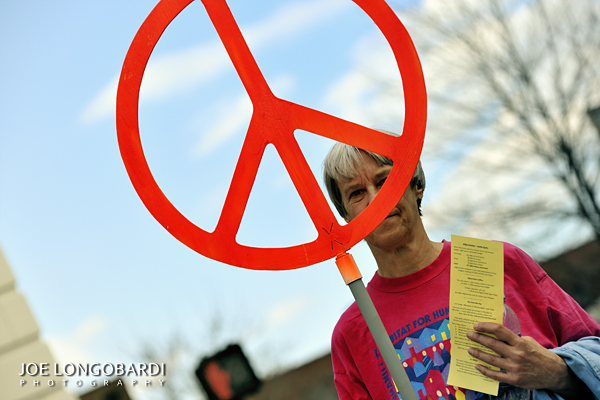
There was definitively less attendance and attention for both the VFP and WIB after Obama’s election in 2008, the contention being that things seemed to just be better, yet violence is still prevailing in our culture and we are still engaged in combat in Iraq and Afghanistan (update: President Obama announces withdrawal of all troops from Iraq by the end of 2011). We had even taken on a new skirmish in Libya that was eventually resolved.
***************************************************
In early 2009, a group of conservative and mostly elderly individuals calling themselves Teabaggers (later to be changed to Tea Party due to the unintentional connotations derived from their earlier moniker) entered the political and social arena regarding the wars and the Nation’s deficits.
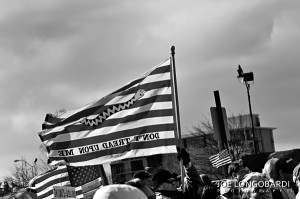
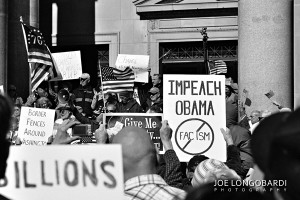
I first encountered them on April 15, 2009—tax day. It seemed to me though that their arrival on the political stage was more a matter of misplaced timing. They came dressed in flags and yes, real teabags; carried signs that demanded the impeachment of President Obama; proclaimed that money does not grow on trees; and demanded that the U.S. pull out of the wars in the Middle-East. On the surface, one could even conclude that in comparison to the peace movement, both groups are two sides of the same coin. And yet, as I observed them, took pictures and engaged in small conversation, I could only think “Where were you guys during the last 8 years?”
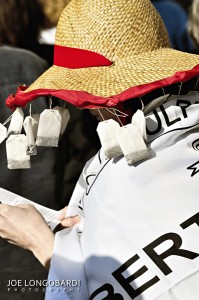
***************************************************
As much as I kept an amicable distance, I was empathetic to the plights and personal stories. I had little recourse but to set the work aside for a while and return to it, no less sympathetic, but more objective. What could have been total neglect of the article became a realization of the timeliness of the work as we approached the 10 year anniversary of the invasion of the country of Afghanistan. And since then, I continued to document other political events with the lessons learned from the past.
Lest we forget, there was another toll that was taken on the American people. The number U.S. Soldiers that lost their lives totals some 4,400, while the number of those irreparably injured exceeds 31,000. The total number of dead and injured from both wars is over 919,000 and 1,700,000 respectively. The cost of all this in dollars: Over 1,200,000,000,000.
We rounded up and tortured terrorists that played a part in the attach on September 11, 2001. We even killed bin Laden! One has to question when we will finally be satisfied in extracting our pound of flesh.
I was once challenged on the importance the WIB’s insistence on holding their vigils in spite of threat of arrest during the peak of conflict in the Middle-East. I responded by pointing out that by challenging those who were determined to silence them benefited those who would one day become inspired to express their opinion without threat of intimidation and arrest. Just recently in August of 2011, a rally entitled Go Topless Asheville was waged at Pack Square that argued that women should be allowed the same privileges as men to walk the streets of the city without apparel covering their breasts. Yes, it is legal in North Carolina to go topless, but the point that I believe was lost on many was that women should not be harassed for doing so, thus the insistence of upholding their rights to be treated as equals in The United States of America. And if the rights were not exercised, then they fall into atrophy and decay—much like the freedom of speech.
What I have collected over the years is not so much a report on a peace movement, so much as a record of the lives of people that could every well be you or me. As the country grapples with endless wars, and ceaseless unrest in a growing number of factions that ritually rise up when societies become more fearful, more and more individuals have come together to organize their personal outrage. But not just groups that have grown weary of wars–people that have expressed an intolerance of inflation; impatience with a stagnant economy; distrust of a corrupt political system; hatred of Federalism; questioning the legitimacy of the first black U.S. President; an increase in religious and cultural intolerance. Tea Parties and Occupy Wallstreet! There has been an expansion of tribalism within the borders of a Republic.
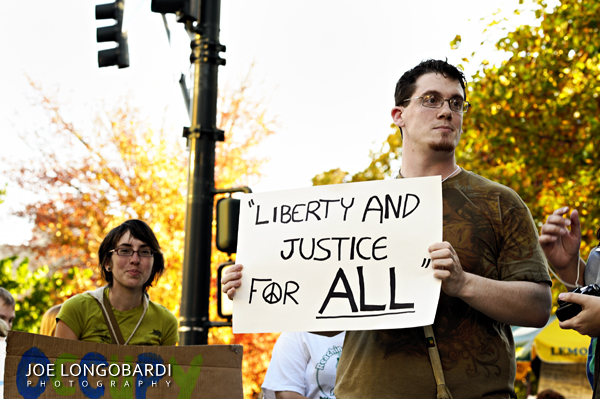
***************************************************
Epilogue
On a cool Fall day in late September, I managed to catch up with a woman and local fixture in Asheville activism by the name Clare Hanrahan. After several weeks of working around her busy schedule, I received a call from Clare asking if we can meet just in front of the court house located at Roger McGuire Green. She asked how she can recognize me. I said I’ll be a tall thin guy with shaggy red hair. She said I would recognize her as a spirited war resister with streaks of pink in her hair.
A youthful 62, Hanrahan was seated on a park bench awaiting the arrival of several dozen people that in several days, on October 1st, would evolve into what would be known as Occupy Asheville, a movement in solidarity with the Occupy Wallstreet demonstration that began on September 17th of 2011 in New York. I asked regarding her role as an activist in this area: as a participant in No-Nukes rallies and as a founder of the Asheville Chapter of Women In Black.
“I’m an eclectic anti-authoritarian”, she began. “I participate to speak up against injustice and to teach others to hone tools of non-violence, though I believe we are eons away from that.” Pointing towards a magnolia tree some twenty feet from us, she explained that she had chained herself to that tree to prevent its removal along with the adjacent Pack Tavern to be replaced with a condominium by “a greedy developer.” In 1901, philanthropist George Willis Pack donated the land in perpetuity to the people of Asheville.
“There were no restrooms of course, so the firemen next door allowed me to use theirs when I needed to take a break.” Images of Hanrahan tethered to the tree made the rounds in newspapers and the Internet. As successful as she was in this case, she was not able to save any of the targeted pear trees that were removed from downtown Asheville. After several days of being chained to one of the trees, she finally relented adding “I was told that they would not be cut down until after they have bloomed. That’s all I asked for, I told them.”
“I persist because it’s the right thing to do—not because it’s always effective”, Hanrahan added. I asked her about her involvement with the WIB and if she felt that her years of participation had any effect—if she and others were intent on continuing and if there will be future generations of activists to pick up the gauntlet.
“The WIB held that space for free speech so that it would not be forfeited.” At the peak of the war, the city of Asheville was persist ant in curbing demonstrations against the wars in Afghanistan and Iraq. Though it was unpopular at the time to speak out against the bush wars, Hanrahan asserted that “You cannot sanitize free speech where it has no impact.”
“But you go where you are touched most—you can’t tend to all causes,” she clarified. “The cost of war is for generations. We create homeless vets, the unemployed… I’ve met many people from different walks of life while standing with that tree.”
Coming around to the Wallstreet protests and the anger being demonstrated by a hurting middle class, Hanrahan confessed that “You caught me in a pondering time of my life: how we are all complicit [in] wars, the economy, the earth…I want to give up every few weeks.”
“Younger people seem less patient in dealing with the long term commitment to civil disobedience– they are more inspired by current urgency. Standing on lines seems futile. The seem to have a case of oppositional defiance disorder. This meeting here today [for Occupy Asheville] was started at the Mellow Mushroom [Pizzeria]– it was very spontaneous.”
“I’ll persist till the end,” she continued. “At 62, I may have another 30 years. And we need to build relationships—trust each other and find peaceful methods of resistance. We Americans are a subdued people, but were are not defeated yet.”
Commenting on the current riot control of protesters on Wallstreet in New York, Hanrahan remarked “ A peaceful or violent demonstration will dictate the appropriate response from the police. [We] must practice non-violent resistance.” Hanrahan remarked that most of our elected officials are “meaningless choices. But that doesn’t mean you don’t go out to vote. It’s a way of making your voice heard. And there are other ways to vote—speaking out on streets!”
“I can’t strap myself to every tree”, she added “That would be ridiculous.”
Capping off where we started discussing the effect she and others had on raising awareness of social issues, Hanrahan stated “Ten years back, When I stood at the Vance Monument, no one else was there. But then another would come—then another.”
“Wealth for me is a breeze; sitting in a park, watching children play. Sitting on a bench, talking to you. I chose to live simply—not to have lots of money.” A fellow named Noah approached Hanrahan with whom she was acquainted. I thanked her for her time. Noah then accompanied Hanrahan to the Magnolia Tree as she explained the history of the tree and the adjacent building. I managed to take a few quick photographs of Hanrahan with tree. The images were unique in the fact that she was unrestrained and the tree was in no danger at this time of being cut down.
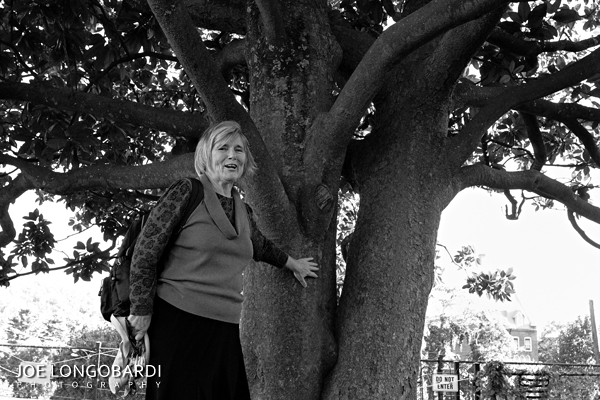
In time, a few people began to gather at the stage of Roger McGuire Green—then another.
****************************************************************
The Photos
Over the years, I continued to document in photos the comings and goings of the peace movement in Asheville. This included photos for the group Peace Town that branched off of VFP and WIB. I offer these images to the viewer in the hope not just to convey a group of individuals coming together for a common cause, nor to imply that they even convey a common voice. In these photos depicting the grassroots peace movement, my goal is to allow the strength and character of the individual standout from the multitude; each person standing among his or her peers contributing a personal voice, interpretation, and an embrace of the profound sadness for the plight of others. These are people from various walks of life who found themselves drawn to a particular belief, either through personal experience or inner revelation that served as a catalyst to transform his or her life, that there exist no fine line between right and wrong: that torture and inhumane treatment cannot be rationalized to justify a nation’s desire to bring peace and stability to the masses. Inspired by these peoples’ altruism and conviction, my hope is to capture the essence and experience of standing among these men and women; capturing the mundane as well as the fleeting moments of kudos and camaraderie that accompany the long periods of standing bare to the world and bearing the unanticipated; and to capture the subtle nuances that may escape our notice when we acknowledge only in haste.
For the photos of the Women In Black who stand in silence to express their sadness for the abuse and torture inflicted on the unrepresented, my aim is to convey the solitude and stillness of their silent vigils as the city races pass them in a seamless blur. Sometimes the city casually acknowledges the gathering; other times it is absorbed in material concerns.
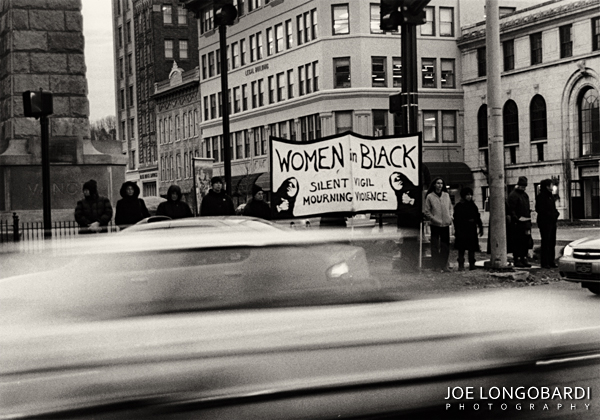
In contrast to the serene WIB, the Veterans For Peace are a far more dynamic demonstrative group of individuals having seen firsthand the horrors of war, and are not about to reign in their sentiments and curb their outrage. The signs they brandish and theatrics they incorporate to elicit gut reactions from passersby are blatant and effective, and incite both positive and negative reactions from all walks.
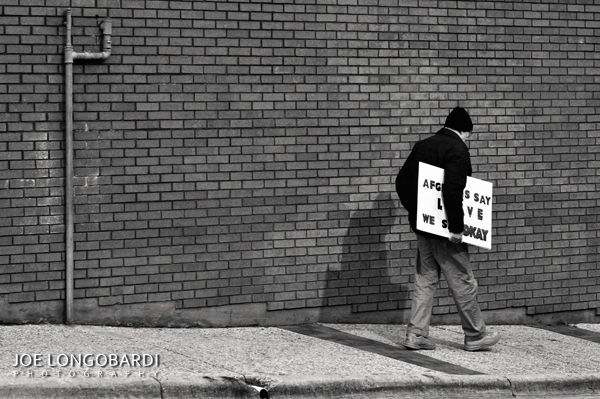
In time, many of these individuals have and will go their separate ways, possibly to join the ranks of other causes or merely to move on for the sake of their own emotional well being. Many of these organizations will splinter or grow smaller. The departure of these individuals will not be the weakening of any protest movement so long as the idea and spirit of justice is carried and nurtured in each of their hearts. This is the foundation of all peace movements, beginning with one person who witnessed the injustice mankind was capable of inflicting, and how that person set about to transform the heart of others.
Joe Longobardi, October 7, 2011.
All photos and copy are Copyright 2011 Joe Longobardi. All Rights Reserved. joelongobardiphotography.com/

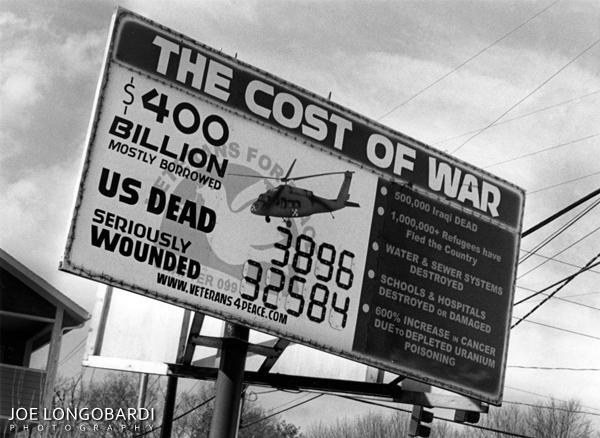
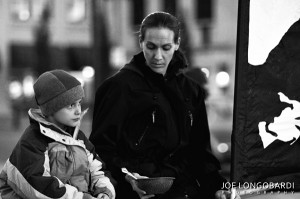
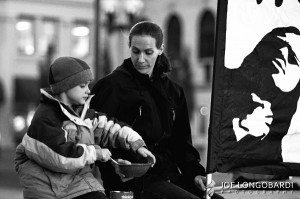
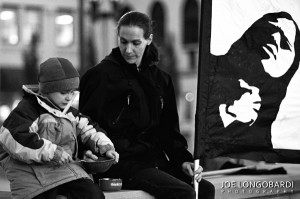
I really enjoyed reading this post. You did an outstanding job!
Comment by Missy Corrales — December 19, 2011 @ 3:39 am